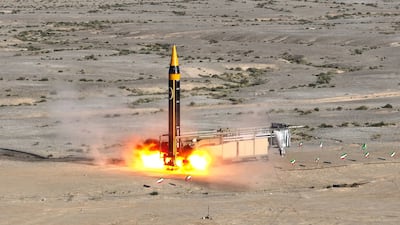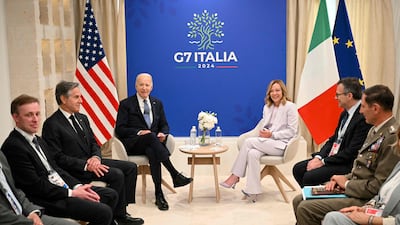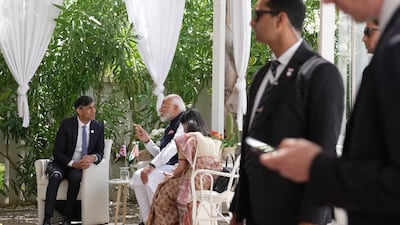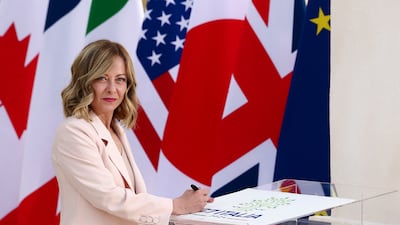The Group of Seven countries on Friday urged Iran to "cease and reverse" nuclear escalations and stop continuing uranium enrichment activities that have no credible civilian justifications.
The leaders said they would be ready to enforce new measures if Tehran were to transfer ballistic missiles to Russia, according to a communique.
"We urge Tehran to cease and reverse nuclear escalations, and stop the continuing uranium enrichment activities that have no credible civilian justifications," the statement said.
The Middle East has been one of the main discussion points at the two-day summit that started on Thursday at the luxury resort of Borgno Egnazia in southern Italy.
Leaders have highlighted their concern about escalations on the Lebanon-Israel border and endorsed US President Joe Biden's ceasefire plan for Gaza in addition to ramping up support for Ukraine.
The G7 members are the US, UK Canada, France, Germany, Italy and Japan. Several leaders from the Global South, as well as Pope Francis, have been invited for talks on Friday afternoon on Artificial Intelligence.
The G7 concerns about Iran comes a day after the International Atomic Energy Agency said that Tehran is further expanding its nuclear capacities. The agency's board of governors last week passed a resolution criticising Tehran's lack of co-operation with the UN nuclear watchdog.
The IAEA informed its members that Tehran told the agency it was installing more cascades at the enrichment facilities in Natanz and Fordow.

A cascade is a series of centrifuges, machines used in the process of enriching uranium. A diplomatic source deemed this development as "moderate".
So far, Iran has been enriching uranium in those cascades up to 2 per cent purity. It already enriches uranium up to 60 per cent, a short, technical step away from the weapons grade of 90 per cent.
Tehran did not immediately acknowledge the decision. However, it comes after Iran threatened to take action following a vote earlier this month at the IAEA's board of governors that censured the country for failing to co-operate fully with the agency.
The decision immediately drew criticism from US State Department spokesman Matthew Miller.
“Iran aims to continue expanding its nuclear programme in ways that have no credible peaceful purpose,” Mr Miller said. “These planned actions further undermine Iran’s claims to the contrary. If Iran implements these plans, we will respond accordingly.”
Mr Miller did not elaborate on what steps the US and its allies might take. However, Iran already faces grinding economic sanctions from Washington and others that have deeply cut into its economy and sent its rial currency tumbling over recent years.
The Islamic republic has gradually broken away from its commitments under the nuclear deal it struck with world powers in 2015.
The landmark deal provided Iran with relief from western sanctions in exchange for curbs on its atomic programme, but it fell apart after the unilateral withdrawal of the United States under then-president Donald Trump in 2018.
Efforts to revive the deal have so far failed.



































